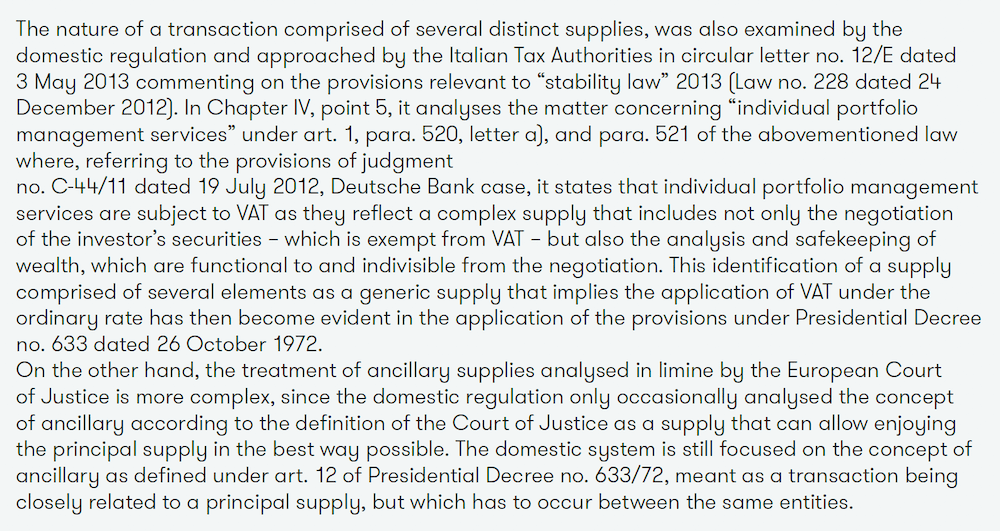-
Transactional advisory services
Find out more about the transactional advisory services of Grant Thornton Financial Advisory Services
-
Valuations
Find out more about the valuations services of Grant Thornton Financial Advisory Services
-
Mergers and acquisitions
Find out more about the merger and acquisition services of Grant Thornton Financial Advisory Services
-
Forensic and investigation services
Find out more about the forensic and investigation services of Grant Thornton Financial Advisory Services
-
Recovery & reorganisation
Find out more about the Recovery & reorganisation services of Grant Thornton Financial Advisory Services
-
Business risk services
Find out more about the business risk services of Grant Thornton Financial Advisory Services
-
Business consulting
Find out more about the business consulting services of Grant Thornton Financial Advisory Services
-
Capital market
Capital market
-
Corporate and business tax
Find out more about our corporate and business tax services.
-
Direct international tax
Find out more about our direct international tax services.
-
Global mobility services
Find out more about our global mobility services.
-
Indirect international tax
Find out more about our indirect international tax services.
-
Transfer pricing
Find out more about our transfer pricing services.
-
Litigation
Our lawyers and accountants can manage all defense measures provided not only by the Italian law, but also by EU regulations and conventions
-
Family business
Find out more about our Family business services.
-
Legal
The client can be assisted in every need and with the same care both on important operations or disputes and on simple matters

-
Back office outsourcing
Find out more about our Back office outsourcing services
-
Business process outsourcing
Find out more about our business process outsourcing services.
-
Compilation of financial statements
Find out more about our compilation of financial statements services.
-
Tax compliance
Find out more about our tax compliance services.
-
Electronic invoicing
Find out more about our electronic invoicing services
-
Electronic storage
Electronic storage is an archiving procedure that guarantees the legal validity of a digitally stored electronic document
-
Revaluation of corporate assets
Find out your civil and fiscal revaluation of tangible, intangible and financial assets
-
Human resources consulting
Find out more about our human resources consulting services.
-
Payroll
Find out more about our payroll services.
-
HR News
HR News the monthly information newsletter by Grant Thornton HR
-
Cybersecurity
GT Digital helps clients structure information security management internal functions, also through partially or totally outsourced functions
-
Agile and Programme Management
GT Digital provides support in the adoption and implementation of different portfolio management
-
Robotic Process Automation
Our “BOT Farm” can rely on digital workers able to help clients in routine activities, allowing employees to deal with more added-value activities
-
Data strategy and management
GT Digital can support clients in seizing the opportunities offered by Big Data, from the definition of strategies to the implementation of systems
-
Enterprise Resource Planning
We support clients in selecting the most appropriate ERP System according to their specific needs, helping them also understand licensing models
-
IT strategy
GT Digital supports clients in making strategic choices, identifying innovation opportunities, comparing themselves with competitors
-
IT service management
We can support with software selection and with the implementation of dedicated tools for the management of ICT processes
-
DORA and NIS 2
The entry into force of the DORA Regulation and NIS2 represents a major step towards the creation of a harmonised regulatory framework
Judgment of the European Court of Justice no. C-505/22 dated October 5, 2023, Deco Proteste - Editores case
By Mario Spera - Principal of Bernoni Grant Thornton
1. Introduction
In sentence no. C-505/22 dated October 5, 2023, Deco Proteste – Editores case, the European Court of Justice mainly focuses on the qualification of free supplies of goods with a value not higher than EUR 50 to new customers upon the subscription to a magazine edited by the abovementioned company. In the specific case, these are “magazines and other documents providing information on consumer protection” sold only on subscription; gifts (which can be tablets or smartphones) are sent by courier together with the magazine after the first monthly subscription payment made by new subscribers, who “may keep the subscription gift without incurring any penalty, after the first monthly payment, even if the subscription is cancelled” (ref. point 10).
The Tax Authority in Portugal (where the company has its office) deemed that gifts with a value not higher than EUR 50, should be considered as “gifts” supplied to consumers, but found that their total amount exceeded the ceiling of 0.5% of the turnover of the previous calendar year (according to the Portuguese regulation), and this is a further element supporting the fact that they should be subject to taxation. Moreover, during the tax assessment, the authority noticed that a 6% reduced rate (effective in Portugal) was applied to the invoice issued for the subscription to the magazine, without any mention of gifts to new subscribers.
Based on all considerations made, the Tax Authority deemed that, since gifts fall within the category of goods subject to tax deduction, regardless of the fact that they represent or not goods related to the main business activity, they are subject to the ordinary VAT rate applied on a taxable base made up by the purchase price of goods.
On the other hand, Deco Proteste - Editores believed that gadgets at issue fall within the definition of “low value gifts”, considered their cost lower than EUR 50.
During the proceedings started due to the contrasting opinions of the parties, the referring court substantially asked the European Court of Justice to clarify what is the nature of gifts granted to new subscribers and, in particular, whether they should be considered as: i) supplies of goods made free of charge, regardless of their relationships with the subscriptions they refer to; or ii) part of the principal transaction (subscription); or iii) part of a commercial package “comprising a principal transaction (the subscription to the magazine) and an ancillary transaction (making the gift)”, in which the “gift” should be considered as a “supply for consideration instrumental to the subscription to the magazine”. Further requests are of a limited general relevance and focus mainly on a specific Portuguese regulation, which creates a link, for the purposes of the application of VAT, between the amount of goods supplied free of charge and the exceeding of 0,5% of the turnover realized by the taxable person in the previous calendar year.
2. Single supply
As it can be deduced from the questions asked to the Court, the matter to be resolved is that relevant to the relation between the goods supplied free of charge to new subscribers and the supply which they are obliged to receive. In more occasions, the Court was asked to define whether a transaction which comprises several elements is to be regarded as consisting of a single supply or of several distinct and independent supplies, considered that, in sentence no. C-392/11 dated 27 September 2012, FFW case, specifies under point 14 that, according to the provisions of art. 1, para. 2, sentence 2 of Directive 2006/112/EC[1] “every supply must normally be regarded as distinct and independent”.
This implies that the presence of several elements in a transaction requires a careful analysis in order to establish if the several transactions, to be considered as distinct, constitute a single transaction when they are not independent of each other (ref. judgment no. C-425/06 dated 21 February 2008, Part Service case, point 51). Subsequently, a supply shall be considered as a single supply also “where two or more elements or acts supplied by the taxable person to the customer (...) are so closely linked that they form, objectively, a single, indivisible economic supply, which it would be artificial to split” (ref. judgment no. C-41/04 dated 27 October 2005, Levob case, point 22). This is true even when one or more elements constitute the principal supply and the other element(s) constitute(s) an ancillary supply, regarded as a supply that “does not constitute for customers an end in itself but a means of better enjoying the principal service supplied” (ref. abovementioned FFW judgment, point 17).
3. The considerations provided in judgment no. C-505/22
Firstly, the Court of Justice deems it appropriate to specify that the elements constituting a single supply should be evaluated considering the characteristic elements of the transaction concerned, from the perspective of an average consumer. In particular, it must be assessed whether the several elements are indivisible or not and the economic purpose of the transaction meant as a single supply must be evaluated, then material analyses can be added, such as the “separate access or joint access to the services in question or the existence of a single invoice or a separate invoice”.
In fact, in the case analysed in the Deco Proteste – Editores case, a clear link between the provision of a gift and the subscription to the magazines can be identified, since the goods supplied for free to the new subscribers is an integral part of the commercial strategy of the abovementioned company, which led to a considerable increase in new subscriptions. However, the Court of Justice deems that the existing link is neither systematic, nor sufficiently close for the provision of gifts to be considered as indivisibly linked to the principal supply (subscription), considering that the renewal of a subscription does not give rise to the provision of a new gift and that the company carried out promotional campaigns without offering subscription gifts. Moreover, it must be taken into account that some new subscribers will terminate their subscription after payment of the first monthly instalment, which allows them to keep the gift without being obliged to remain subscribers. Nonetheless, the Court favours another interpretation, which is that of considering the free provision of tablets and smartphones as an ancillary supply to the principal one, since such goods (which make it possible to consult a digital version of the magazines) enable “new subscribers to benefit, under the best possible conditions, from the service provider’s main service, namely the reading of the magazines for which the subscription was taken out” (ref. point 28 of judgment no. C-505-22 under analysis).
In conclusion, the European Court of Justice considers the free supplies as gifts as ancillary to the principal supply and, therefore, as supplies for valuable consideration being subject to the same tax treatment as the principal supply.
[1] “On each transaction, VAT, calculated on the price of the goods or services at the rate applicable to such goods or services, shall be chargeable after deduction of the amount of VAT borne directly by the various cost components”.

